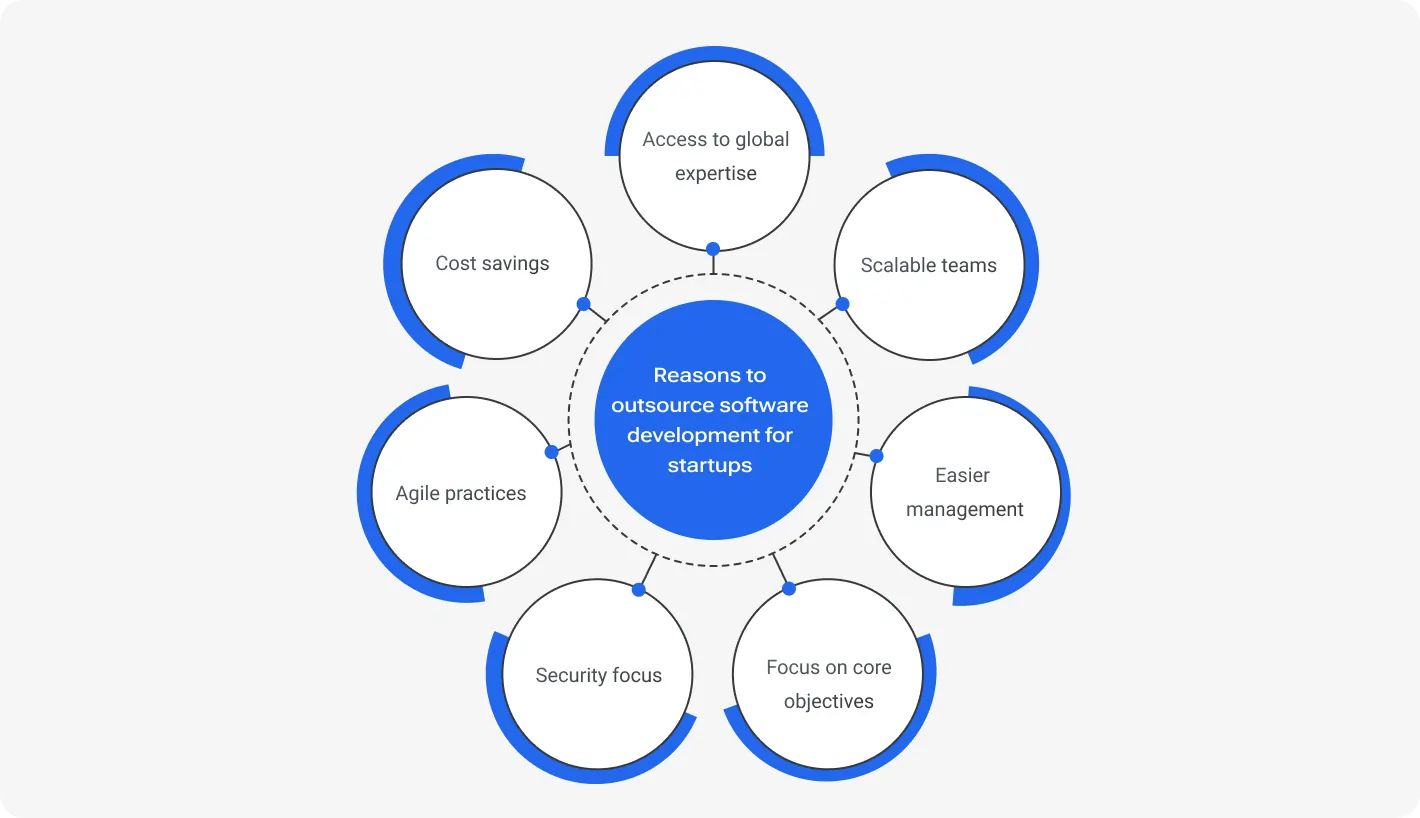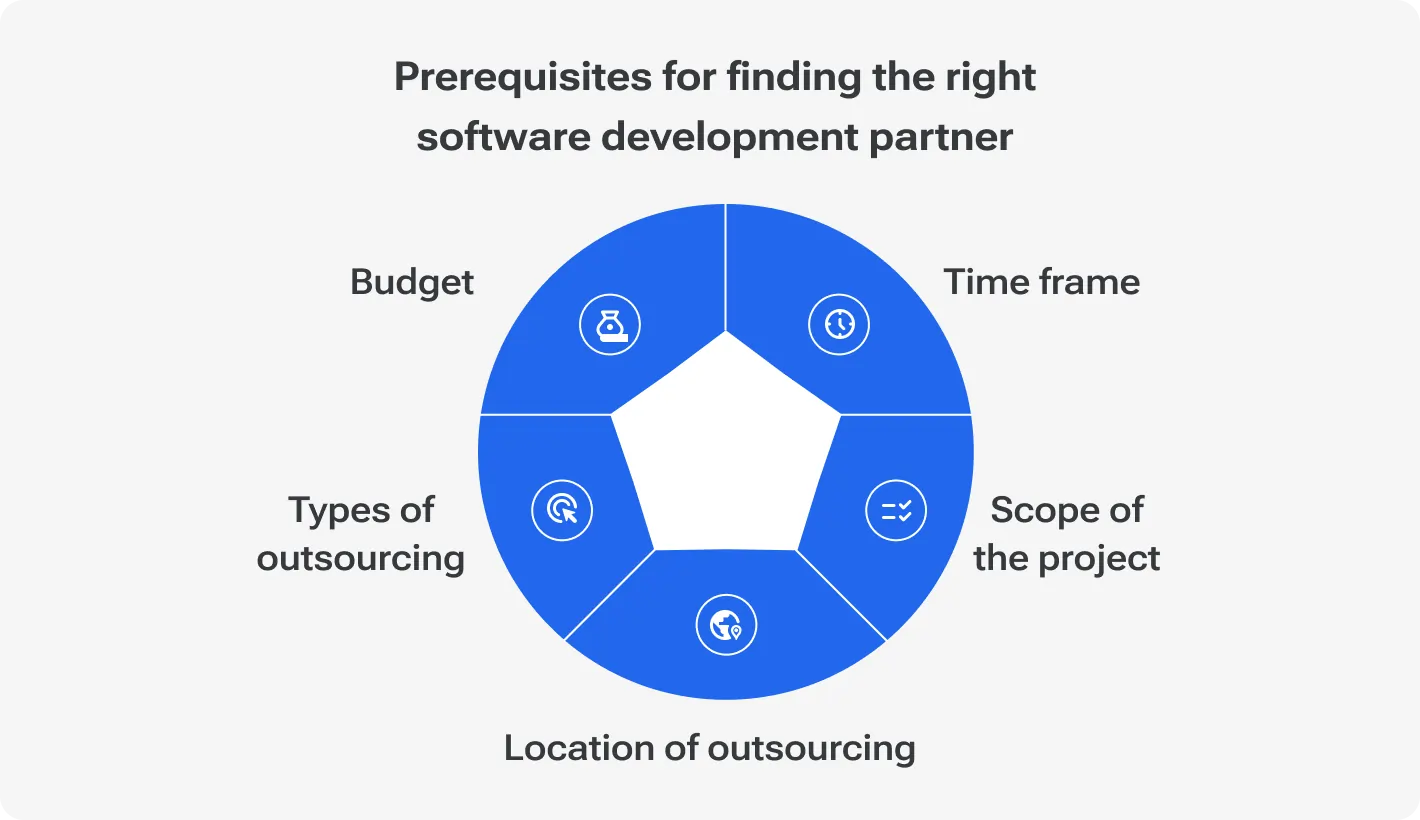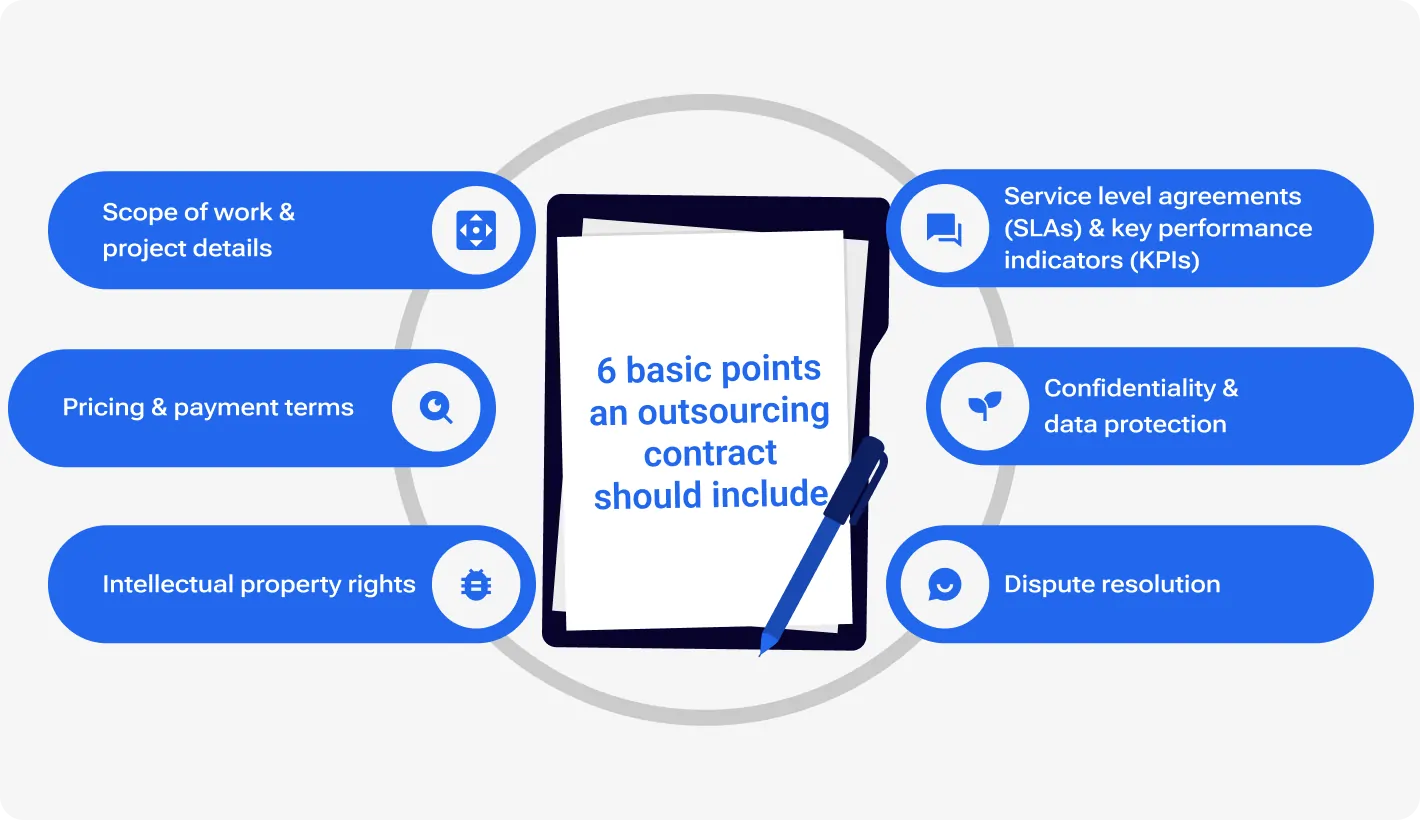Did you know that 63% of startups find it difficult or struggle to scale their tech teams fast enough to meet the changing market demands? Without a doubt, with the competitive business landscape, startups must adapt quickly and stay afloat. Otherwise, they might fall behind.
In such a context, one of the most strategic solutions available is outsourcing software development for startups. Outsourcing gives a strong competitive edge. It helps startups almost instantly tap into global talent, cuts costs, and speeds up time-to-market. In addition, it eliminates the need for big in-house teams.
In this guide, we will explore key reasons startups should consider strategies like staff augmentation services and software development outsourcing in the first place. We will cover aspects like benefits, key considerations, and best practices. We will also deliver some actionable steps or insights to help you get started with startup outsourcing.
Without further ado, let’s proceed to the guide.
Why choose to outsource software development for startups?
Outsourcing is one of the remedies for startups when they face tight budgets along with fierce competition. Naturally, most startups do not have too much financial foundation to work with or investment behind them. Besides, as we established before, competition is a given for any startup entering a new market.
Considering the insights above, let’s examine three key reasons why startups should consider outsourcing startup development as a go-to strategy.
Reason #1. The need to scale and innovate
Startups operate in a dynamic environment where technology evolves at breakneck speed. Businesses need to scale their tech teams rapidly without the long lead times associated with hiring full-time employees to stay ahead. Outsourcing enables startups to add specialized skills and innovative thinkers to their projects quickly.
To illustrate, a startup with an AI platform can quickly grow its team. Using offshore software developers, it can launch new features faster than its competitors.
By selecting IT outsourcing for startups, startups get a chance to experiment with new tech, new skillsets, and new frameworks. Such experimentation is a great way to drive innovation without having the burden of permanent hiring. The flexibility outsourcing offers is all about supporting rapid iteration coupled with continuous development. These are vital for growth and innovation.
Reason #2. Resource optimization and cost consideration
For startups, every dollar counts. Outsourcing software development can reduce operational costs dramatically. Hiring full-time employees comes with high overhead expenses including salaries, benefits, and office space. Outsourced teams, often available at competitive rates, offer significant cost savings without compromising quality.
Recent studies have shown that replacing in-house talent can cost 50% to 100% of an employee’s annual salary. By outsourcing, startups can avoid these hidden expenses while accessing top-tier expertise. Also, by choosing how to outsource software development strategically, startups can optimize their resource allocation and achieve a higher return on investment.
Reason #3. It is all about competition
The speed of technological change means that startups must be agile to remain competitive. Outsourcing allows companies to adapt to market trends rapidly, incorporate the latest innovations, and respond to customer demands more quickly than traditional hiring models permit.
For a startup, being a part of the technological age means they need to innovate and find means faster to stay competitive. Tools and technologies change at a lightspeed. Consider the recent release of Deepseek and the fact that this AI tool has wiped out a $1 trillion worth of value in the U.S. stock market. Now, imagine a startup trying to enter an AI-saturated market with such massive changes happening.
Namely, startups that can successfully use outsourcing have a way better chance of competing in any given market. For instance, they can successfully outsource software development and shift focus from routine coding tasks to high-level strategy and product design. Such agility helps startups keep pace with larger competitors and rapidly changing consumer expectations.
Outsourcing software development for startups is not just a cost-saving measure. In some sense, it’s a strategic move for fostering innovation and agility. Outsourcing is the strategy enabling startups to thrive in a competitive, fast-paced environment.
End-to-end solutions with predictable budgets, a time-to-market advantage with budget savings of up to 50%
5 key benefits of outsourcing software development for startups
Outsourcing software development for startups offers several tangible benefits. In most cases, it is all about saving costs, having greater access to a global talent pool, and much more. When deconstructing each significant advantage, we will focus on key points and the aspects that can help you get the most out of each benefit discussed.
Here are five key benefits that make outsourcing particularly appealing for startups in 2026:
Benefit 1. Significant cost savings
One of the most compelling advantages of outsourcing startup development is the reduction in operational and development costs. Outsourcing eliminates many expenses, especially the ones associated with
retaining full-time employees.
In any case, Forbes suggests that direct hiring always comes at a greater cost than using staff augmentation offered by outsourcing partners. Besides, the outsourcing process takes way less time.
According to recent industry studies, outsourcing can reduce development costs by up to 40%. The key reasons behind cost savings correlate to accessing talent at competitive rates in different parts of the world. In countries with lower living costs, you can hire a software developer at a much lower rate than those with a higher cost of living.
For example, a startup based in the U.S. that outsourced its development work to an offshore team in Eastern Europe reported cost savings that allowed it to invest more in marketing and user acquisition.
Startups can save on overhead. This lets them focus resources on key areas like product innovation and customer support.
Benefit 2. Access to a global talent pool
Outsourcing breaks geographical boundaries. It gives startups access to a vast pool of skilled developers and IT professionals worldwide. Such a global reach means startups are not limited to local talent. In many cases, local talent can be expensive and scarce. When a business can tap into the global workforce pool, there is a much higher chance of finding the right skill set for the right price.
In other words, through outsourcing software development for startups, businesses access niche skills and specialized expertise. Such a diversity in talent can lead to more creative solutions and innovative product features. Getting experts with different skill sets on board is a direct way of finding better solutions to your business needs.
For example, a startup created a blockchain solution. They hired skilled developers from different countries. Their blockchain expertise made the platform more secure and strong.
Access to a global talent pool helps improve operations. It brings in best practices from different markets. This makes the startup more competitive.
Benefit 3. Faster product development and time-to-market delivery
For startups, speed is everything. When we talk about “speed,” it means how fast a starting business can deliver its product on the market. As we established before, startups exist in a constant state of competition. In such a case, if you can increase time-to-market, you will have a competitive advantage.
Startup outsourcing can dramatically accelerate development. With ready-made pre-vetted teams already experienced in handling various projects, starting businesses can reduce the time required to launch new products.
How? Outsourced teams often follow agile methodologies and have established workflows enabling fast iterations and quicker turnaround times. Such efficiency shortens the product development cycle. It also allows startups to bring innovations to market faster than if they had built their teams internally. Again, building an internal team takes much more time than outsourcing one.
Why agile and outsourcing is better together
Fast development is key in today’s market. Delays can lead to lost chances and less customer interest.
Benefit 4. A higher degree of flexibility and scalability
Startups frequently face fluctuating demands and evolving project requirements. Outsourcing offers the flexibility to scale teams up or down based on current needs without the long-term commitment of hiring full-time staff.
The flexibility that comes with outsourcing startup development allows companies to respond quickly to shifting market conditions and scale up or down with minimal friction. Whether you need to ramp up development for a product launch or scale back during slower periods, outsourcing provides a dynamic solution that adapts to your business cycle.
When outsourcing the required talent, you can always be sure to have access to the workforce when most needed. In addition, when you pass the phase of changing project requirements, a starting business can as quickly scale down. It is a win-win situation.
Benefit 5. Reduced risk with expert partners
Partnering with established outsourcing companies reduces risks like poor quality and project delays. Reputable partners have a proven record of delivering quality solutions. They also use strict processes to manage development projects.
Experienced partners can reduce the risks of miscommunication and technical errors. They create a safety net that keeps projects on track, even if internal teams face turnover.
To illustrate, a startup could avoid major vulnerabilities by outsourcing security testing to a specialist firm. The key concern here is to protect data and build customer trust.
Startups work with expert partners to access proven methods and valuable experience. This lowers the risk of costly mistakes.
How does the offshore time difference work in your favor?
Key aspects to consider before outsourcing software development
Before outsourcing, startup leaders and owners must address several key considerations to maximize the benefits and avoid common pitfalls. These are the aspects to always keep in mind. If you are unsure whether to start with outsourcing startup development, review the list below once more.
1. Define clear business goals, needs, and requirements
First and foremost, start with a clear understanding of what you need. This means you need to Establish specific, measurable goals for your software development projects. Use the SMART approach to guide the outsourcing process and evaluate potential partners. The rule of thumb dictates that if your goal is hard to measure or quantify, it will be extremely hard to achieve. So, set clear and measurable goals. If unsure, communicate with the business analysts to make sense of your business needs.
To illustrate, a startup might set a goal to launch a mobile app with key features in six months. This clear goal helps find a partner who can meet deadlines and stay within budget.
Clear goals help you compare service providers more easily. They offer a simple benchmark that keeps the project on track. When considering IT outsourcing for startups, share your measurable objectives with your potential partner. This step ensures both sides understand what is expected and reduces the risk of delays.
2. How to select the right development partner
Choosing the right outsourcing partner is critical. Look for companies with proven expertise, relevant industry experience, and a cultural fit with your startup. Review portfolios, case studies, and client testimonials to gauge their performance.
Ask for details on past projects and how they handled obstacles. When you want to successfully outsource software development, clear communication matters. This approach helps you see how a partner manages work and meets expectations. Taking the time to select the right partner can lead to a smoother project from start to finish.
Luckily, there is no need to engage in an extensive search — Devico is your reliable partner for software development for startups, offering tailored solutions that match your stage and goals. With years of experience in the game and a proven track record, we offer different outsourcing methods and models that meet your particular needs.
3. Addressing security and data privacy concerns
Security is non-negotiable. Ensure potential partners maintain high data protection standards and comply with international security protocols. Ask about their data handling practices, encryption methods, and compliance certifications.
For instance, a startup working on a fintech solution required its outsourcing partner with ISO/IEC 27001 certification to guarantee robust security practices.
4. Setting expectations for budget, timeline, and milestones
Clear communication about budgets, timelines, and project milestones can prevent misunderstandings and delays. Draft a detailed contract that outlines deliverables, performance metrics, and penalties for missed deadlines.
For example, a startup negotiated a contract with clearly defined milestones and regular progress reports, which helped keep the project on track and within budget.
When outsourcing software development for startups, precise security requirements help reduce risks. Setting detailed rules builds trust and helps prevent issues later in the project. When security and compliance are taken care of early in the game, it spares you long-term headaches and troubles.
9 best practices for outsourcing as a startup
Effective outsourcing requires a strategic approach. Here are nine best practices to help startups successfully outsource their software development projects:
1. Retain control over product-market fit
Retain control over product decisions. Even when you outsource parts of development, you steer the roadmap and guide the user experience. Hold regular meetings to discuss progress and adjust features as needed. You set clear priorities to match market needs.
Many startups use outsourcing software development for startups to access expert teams while keeping their vision. This method shows you know how to outsource software development without losing control. Keep close ties with your external team. Regular updates help you build a product that resonates with your audience and drives growth.
2. Try nearshoring instead of offshoring
Try nearshoring to reduce time zone differences. Work with partners in neighboring regions for easier communication. Teams in nearby countries share similar cultures. This choice shortens turnaround times and speeds decision-making. Many startups choose outsourcing startup development from nearby regions. The right talent for the right price can be closer than you think.
Working close in time and culture minimizes misunderstandings and boosts progress. Naturally, people living in the same region share cultural and linguistic contexts that are closer. As a result, a business gets smoother communication and fewer problems with cultural discrepancies. Quick responses and smooth interactions give your project an edge.
Choose local partners for faster meetings and clear expectations. Such an approach benefits startups looking for IT outsourcing for startups that feel more like an extension of their in-house team. If that’s the case, staff augmentation is the place to go.
3. Choose companies with a fully-managed approach
Choose companies that handle every step of your project from beginning to end. Pick a partner who takes charge of project management, quality control, and support. In the best-case scenario, you can even get a partner on board, the one handling legal, security, and compliance aspects.
The right choice reduces extra work for your team. Many startups use outsourcing software development for startups when they need full-service help. When all is done correctly, you know how to outsource software development without added stress.
A managed and seasoned provider plans, develops, and follows up on tasks of any given complexity. They meet deadlines and manage milestones for you. In turn, you can focus on core business tasks. A partner that takes full responsibility helps your project run smoothly and keeps workflows clear.
4. Pick a provider that aligns with your company culture
Pick a provider that matches your company culture. In other words, you need to find a vendor sharing your values and work habits. Talk about communication styles and decision-making processes. Choose a partner feeling like an extension of your team. Many startups use outsourcing startup development to get expert help while keeping their unique culture. When you find a match, you don’t need to worry about misaligning values.
Your partner should also have experience in software development for startups. Holding regular meetings and sharing your vision builds trust. Such a practice minimizes misunderstandings and creates a smooth, productive collaboration.
5. Make sure each partner offers excellent onboarding and training
Make sure each partner provides a smooth onboarding process and solid training. You need clear documentation and walkthroughs when a project ends. The external team should transfer knowledge to your in-house staff. Many startups use outsourcing software development for startups to complete projects quickly.
Organize training sessions so your dedicated team can take over tasks without delay. Detailed documentation reduces gaps and builds continuity. A clear offboarding process helps maintain progress even after the project wraps up. Choose partners that support your team during every transition.
6. Default on outsourcing when necessary
Not every project fits in-house work. Outsource non-core tasks or specialized work that does not align with your core strengths. Evaluate each project carefully and decide what tasks benefit from external expertise. Many startups choose outsourcing startup development for functions like quality testing and security.
Focusing on core activities allows you to add value where it counts. Analyze your needs and assign tasks to expert partners when possible. This clear focus helps you allocate resources wisely and keeps your team on strategic work. Use outsourcing only when it brings clear benefits to your project.
7. Get help with strategy for high-cost services
Get help with planning high-cost services like quality assurance or security testing. Work with partners who offer strategic guidance along with execution. These partners add value by helping manage costs and suggesting best practices.
Ask for input during the planning stage to avoid overspending. A trusted partner helps you pick the right solutions and lowers risk. This approach lets you maintain high quality without stretching your budget. Strategic help makes expensive tasks more manageable and efficient.
8. Avoid jack-of-all-trades companies
Avoid partners who claim to do everything. In most cases, vendors claiming to offer one-size-fits-all solutions are the ones offering mediocre products and services. Instead, focus on companies with deep expertise in the skills you need. Specialized vendors deliver higher-quality work on complex projects. Many startups choose outsourcing startup development with providers that excel in one particular area only. If you are working on a blockchain-related project, it makes great sense to work alongside partners excelling in that.
Narrow your search to firms with a strong record in your field. A specialized partner reduces the risk of subpar work and keeps project goals clear. Taking time to choose experts boosts outcomes. Use a focused approach to get reliable solutions and maintain project clarity throughout development.
9. Spend more time vetting your vendors
Last but not least, spend extra time vetting potential vendors before making a choice. Research case studies and check client feedback thoroughly. There are different websites with reviews you can search through:
Test skills with small trial projects to gauge compatibility if the opportunity allows. When setting up test tasks, use clear criteria to measure past performance and quality. Meet with team members to discuss processes and communication.
The careful vetting process reduces risks and saves time later. A strong vetting routine builds long-term trust and boosts project success. Invest time in your research to pick vendors who truly match your needs.
How to get started with software development outsourcing
For startups ready to take the plunge into outsourcing, here are five actionable steps to get started:
Step 1. Assess your startup’s needs
Begin by evaluating your
specific expertise needed.
Create a detailed list of deliverables and outcomes. Decide which parts of the project are core to your business and which can be outsourced.
Step 2. Identify the right outsourcing model
Determining the outsourcing model suits your needs best. Options include offshoring, nearshoring, and hybrid models. Consider factors such as time zones, language compatibility, cost, and the nature of the project when making your decision.
If you have problems selecting the right model, you can always consult with an experienced partner having experience with the most approaches out there. It is always better to talk to the vendors having experience and expertise to match.
Step 3. Research and vet potential partners
Conduct thorough research to identify vendors with proven experience in outsourcing software development for startups. Review portfolios, case studies, and client testimonials. Look for vendors offering a good cultural and technical fit.
The key problem here is to choose among dozens or even hundreds of options. Take your time while doing research. You can search through the Internet and consider word-of-mouth suggestions.
Step 4. Negotiate terms & set expectations
Once you’ve identified a suitable partner, negotiate clear terms regarding deliverables, timelines, budgets, and quality standards. Draft a comprehensive contract that includes performance metrics, milestones, and penalties for delays or poor quality.
Remember, all the details omitted in the agreement or contract can later become a major headache. If unsure about the quality of the contract, get legal help. Yet, experienced vendors offer transparent contracts with every collaboration aspect being out in the open.
Step 5. Monitor and optimize throughout the project
Effective project management is key to successful outsourcing. Use project management tools to track progress, hold regular meetings with your vendor, and adjust as needed. There is a range of options to choose from:
Continuous monitoring lets you identify issues early and optimize workflows for maximum efficiency. However, remember that micromanagement and imposing too much control can be detrimental to service delivery.
Embracing outsourcing for startup growth in 2026
In 2026, the technology scene is more competitive than ever. Outsourcing software development allows startups to scale fast, tap into global talent, and cut costs. Follow these key points to turn outsourcing into a strong growth tool.
-
Scale rapidly. Outsourcing lets you add capacity quickly. You grow without the heavy investment of in-house teams.
-
Access a global talent pool. You can reach experts from around the world. This widens your chance to find the skills you need.
-
Reduce costs. Outsourcing cuts expenses on recruitment and training. It lowers your overhead without lowering quality.
-
Accelerate product development. Expert partners speed up the development process. Your product reaches the market sooner.
-
Adapt Quickly to Market Changes. With agile teams, you can adjust fast to new trends. This keeps you ahead of challenges.
Outsource software development for startups when you want to focus on core strengths like product-market fit and fundraising, while expert teams handle the technical execution. With a clear plan, defined goals, and the right partner, your startup can overcome growth challenges and stay ahead of the competition.
At Devico, we specialize in software development for startups. We offer scalable, reliable, cost-effective solutions tailored to your startup’s needs. Whether you’re looking to build a dedicated team, integrate with staff augmentation services, or simply need guidance on successfully outsourcing IT development, Devico is here to help.
Conclusion
Outsourcing software development in 2026 is a strategic imperative for startups looking to remain agile, innovative, and competitive. With access to a global talent pool and flexible models for outsourcing software development for startups, businesses can:
reduce development costs;
navigate the uncertainties of rapid growth.
Startups that effectively outsource their software development can transform challenges into opportunities, unlocking new potential for growth and innovation. Making the right strategic decisions around startup outsourcing now will ensure long-term success and stability as the market evolves.
By adopting a strategic outsourcing model, startups can survive and thrive. With the right partner, you can achieve significant cost savings, accelerate development, and access the best global talent. All of that is possible without compromising security and quality.
Motivated and focused experts for up to 60% less than locals, delivered in days, not months






